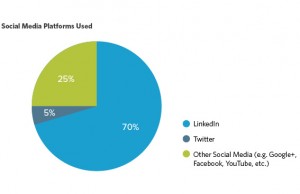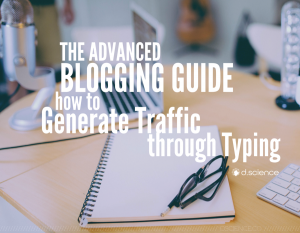There are tons of website builders out there, each of them made to meet the needs of different businesses, industries and each with a slightly different feature set. Are you a small business looking to go digital and build your first website? If this is the case, we’ve got you covered.
We’ve reviewed the best website builders for 2022 which offer the most easy-to-use platforms, useful tools and integrations, fantastic customer support and affordable pricing plans.
Read on to find a top website builder for small business today.
Our Pick for Best Free Website Builder for Small Business 2022: Wix
- If you’re a small business, you probably will need a user-friendly, flexible, and cost-efficient website builder. We compared the top-rated website builders in the industry and found Wix to beat the competition.
- Wix is one of the most robust and flexible website builders on the market. It provides hundreds of templates to choose from, meaning your website can come together come together in a breeze.
- It also offers great site loading speed and a great library of marketing tools for your website as well as excellent customer support.
The Best Website Builder for Small Business 2022
Best Website Builder for Small Business : Compared
When it comes to choosing a website builder for your small business, it’s essential to consider how sophisticated your website needs to be. For example, when you’re just putting together a basic website, you don’t need a lot of features. However, as your business grows and evolves and you begin to consider additional services such as an e-commerce platform or a CRM system for your customers, those features will become increasingly important.
Here are some of our favorites:
1. Wix
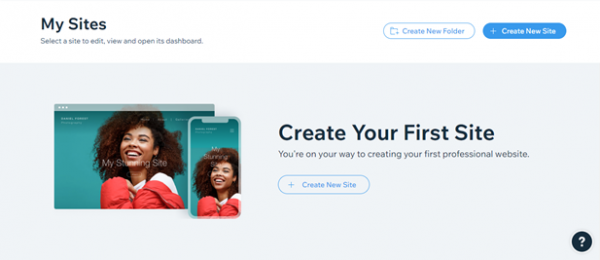
Wix is an incredibly robust website builder application that offers you the flexibility to make a high-quality website for your small business. It’s easy to use and has plenty of features. Plus, Wix offers a variety of templates from which you can choose a design that best works for your business.
Key Features
- Wix ADI – By far, the highlight of Wix is its Artificial Design Intelligence. Wix ADI is a design feature that allows you to build a website without any coding. You simply pick a template and then drag and drop the relevant content. Wix does all of the code generation for you. All you need to do is feed it content and wait for it to design the perfect website for you.
- Template Library – Wix has a massive library of more than 1 million different templates from which to choose. There are plenty of options for all types of businesses, from restaurants and retail stores to health care providers and service providers.
- Advanced SEO Toolkit – Wix offers a variety of powerful tools for search engine optimization. This includes a page builder that enables you to create content easily and quickly. They also offer their own Search Engine Optimization toolbar, which helps you optimize your website for search engines automatically with no need for programming skills.
Pricing per Month
- Website Plans
- Connect Domain – $ 4.50
- Combo – $ 8.50
- Unlimited – $ 12.50
- VIP – $ 24.50
- Business and eCommerce Plans
- Business Basic – $ 17
- Business Unlimited – $ 25
- Business VIP – $ 35
Pros
- Great site loading speed
- Extensive template library
- User-friendly drag and drop interface
- Tons of helpful tools for marketing your website
- Excellent customer support
Cons
- You need to start over if you want to choose a new template
- It’s not easy to migrate your site
2. SquareSpace
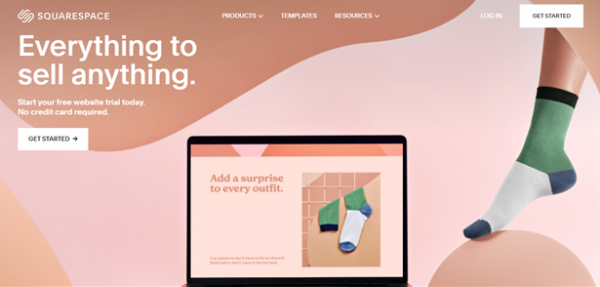
Small business owners and “solopreneurs” are the primary target audience for Squarespace’s website builder. At the time of its founding, Squarespace was a solution for non-web developers to create and manage their own websites.
Squarespace began as a tool for creating static, brochure-style websites, but it has since expanded into a platform that includes built-in ecommerce and marketing tools.
Key Features
- Design Customization Tools – Squarespace has an extensive library of over 300 free templates. But the beauty of Squarespace is its ability to customize these templates by tweaking their colors, fonts, backgrounds, and layouts.
- Built-in Marketing Tools – Squarespace has built-in Google Analytics and a Salesforce-like dashboard that gives you real-time reports on your website’s performance. They also offer integrated social media functionality and APIs for Facebook, Twitter, LinkedIn, and other social media platforms.
- Drag and Drop Builder – Squarespace offers a drag-and-drop builder that makes it easy for you to create a static website by dragging and dropping various elements, such as images, text, and media.
Price per Month
- Personal – $ 19
- Business – $ 33
- Commerce – $ 36
- Advanced Commerce – $ 65
Pros
- One of the most attractive user interfaces in the market
- Tons of template options
- The templates are easy to customize with photos
- An all-in-one platform
Cons
- It’s on the expensive side
- They don’t have phone support
- The marketing tools are quite basic
3. Weebly
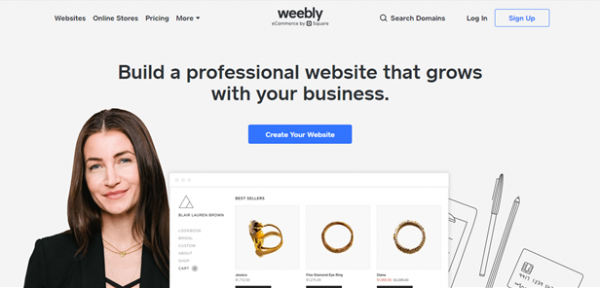
Weebly is an extremely easy-to-use website builder that features a simple drag and drop system for creating sites. Weebly is a good option for those who aren’t experienced with web design applications.
Weebly helps you create beautiful websites quickly, alongside many of the tools that you would expect in a more advanced platform. For example, their drag and drop interface automatically detects all images on the page, allowing you to upload your own images simply by dragging them onto the page.
Key Features
- Complete eCommerce Solution – Weebly offers a built-in shopping cart and CRM functionality. This means that you can manage your customers’ orders, sales, and subscriptions all in one place. They even allow you to send email invoices to your customers. It’s basically got everything you need to run a complete eCommerce site.
- Year-Round Customer Support – Weebly offers a robust customer support system with live chat. They also offer phone and email support.
- Built-in SEO – Weebly offers a built-in SEO toolkit that helps you optimize your website for search engines. The tools are completely comprehensive, allowing you to optimize your site for search engines in a variety of ways, including choosing the most relevant keywords for your website and ensuring your site is mobile-friendly.
Price per Month
- For Websites
- Free
- Connect – $ 5
- Pro – $ 12
- Business – $ 25
- For Online Stores
- Pro – $ 12
- Business – $ 25
- Business Plus – $ 38
Pros
- Comprehensive drag and drop user interface
- Hundreds of templates to choose from
- Simple and straightforward pricing
- Affordable pricing structure
Cons
- Its blogging tools are a bit limited
- You need to pay for extra support
Best Free Website Builder for Small Business
Not everyone has money to spend on their website from the get-go. Some business owners are content with a subdomain and a storefront that just shows off what their brand is about until they start earning money from their brand. It’s important to keep in mind there’s absolutely nothing wrong with this. In fact, we’ve rounded up 5 of the best free website builders for small businesses below
1. Google Sites
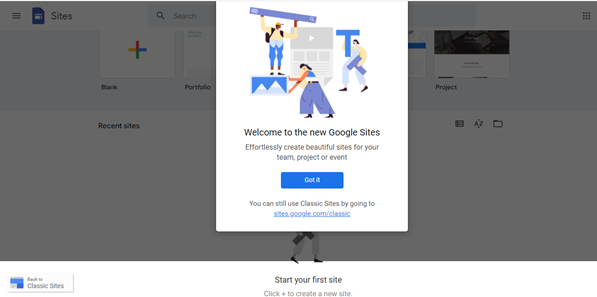
Created by Google, Google Sites is a free website builder that lets you build simple, clean websites. It’s perfect for resource pages, eCommerce sites, blogs, and more. The best part about sites is their ease of use and speed. Google Sites is primarily aimed at education, but it also makes an excellent alternative for small business owners who don’t want to shell out their hard-earned money for a website that isn’t going to pay off in the short term.
Key Features
- Google App Integration – The most attractive part of Google Sites is its integration with Google’s other apps. These apps include Gmail, Drive, and Calendar. You can connect your site to these apps by linking a Google account. This adds a “Drive” feature to your site that allows you to add and share documents, spreadsheets, and presentations with clients and colleagues.
- Live Collaborative Editing – Google Sites has a unique feature that allows you to edit your page simultaneously as others. This will enable you to work with colleagues and clients on projects and updates simultaneously.
- WYSIWYG Interface – Google Sites has a “what you see is what you get” user interface that shows you what your site will look like while you’re editing it. You don’t have to worry about messing things up because it’s not quite finished yet.
Price per Month
Google Sites is absolutely free. In fact, it doesn’t have a paid plan at all. It comes with unlimited storage and visitors per month, so there’s absolutely nothing to worry about.
Pros
- 100% free to use and build on
- Blazing fast website builder
- Google account integration grants access to Google Drive, Calendar, and Gmail integration for documents, spreadsheets, presentations, and more. This makes Sites a great shared resource for small businesses who need the ability to share documents with clients and colleagues.
Cons
- Its functionality is slightly limited
- You are limited to Google apps
2. Webflow
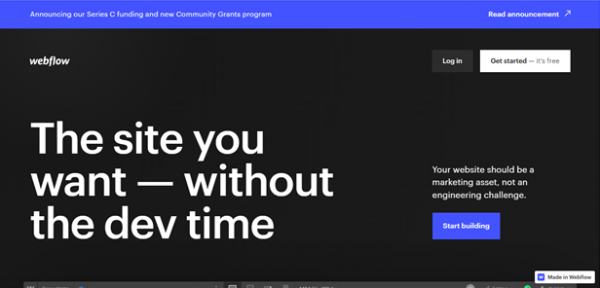
Webflow is a fantastic free website builder that gives you a great range of tools and templates to choose from. It’s a little more challenging to use than Google Sites, but it is easier than Evermotion, which we will discuss shortly.
You can build simple websites with Webflow’s drag and drop interface or use its layout system to create unique templates for your site. Webflow makes it easy for you to upload the content you need for your site.
Key Features
- Design Tool – The Webflow design tool assists users in creating the perfect website for their small business. Its biggest perk is that it writes code for you, so you don’t have to learn how to code by hand.
- CMS – Webflow has a content management system that allows you to manage your site’s content. You can add new content, edit existing content, and delete sections of your site as you see fit in order to keep your site fresh and up to date.
- Webflow University – The platform has an extensive collection of web design tools and resources to help you learn how to use the platform. Plus, it’s an excellent resource for understanding web design principles that you can apply to your own website.
Pricing per Month
- Site Plans
- Free
- Basic – $ 12
- CMS – $ 16
- Business – $ 36
- Enterprise – Custom
- eCommerce
- Standard – $ 29
- Plus – $ 74
- Advanced – $ 212
Pros
- Great functionality for building websites
- The knowledge base is extensive
- Extremely powerful toolset
Cons
- The free plan is incredibly limited
- Not a downloadable software
3. Carrd
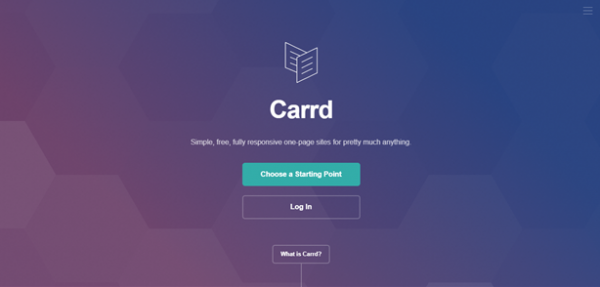
When it comes to creating responsive, one-page websites, Carrd is the tool of choice. A professional-looking website can be made in a matter of minutes with minimal effort. So you’ll most probably be able to discover something that works for you out of the 75+ templates available. Using the editor couldn’t be simpler. Only one page may be published on your website. So, if you want to create a more complex, multi-page website, take a look at our list of the best website builders.
Key Features
- Easy to Use Drag and Drop – Carrd is very easy to use the drag and drop website builder. It allows you to create your website without the need for coding. It’s so simple, in fact, that you can create a professional-looking website in a matter of minutes.
- Animations – Carrd’s drag-and-drop builder allows you to add animated visual effects and animations to your site easily. The builder is straightforward to use, and all the animations can be added within a few quick clicks.
- Tons of Templates – Carrd has an extensive collection of mobile-friendly templates to choose from. Because there are so many templates available, you’ll easily be able to find one that works for you.
Pricing per Year
- Pro Lite – $ 9
- Pro Standard – $ 19
- Pro Plus – $ 49
Pros
- Simple design tools to use
- Comes with tons of templates
- Easy to use drag and drop editor
Cons
- It’s only for creating one-page websites. If you want to create a website that has more than one page, this is not the right option for you.
4. Square Up
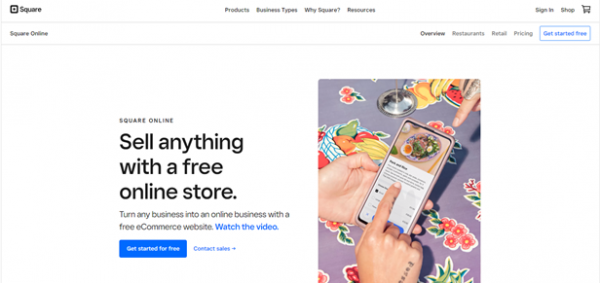
With Square Up, online sales are a breeze. It’s easy to use, so anyone can take advantage of this new manner of selling when you join up for their digital plan. When it comes to ease of use, this product is just like the rest of the Square offerings. As a newbie, you don’t need any knowledge of web design or coding to begin. However, this means that Square Up’s experience may not be as advanced as that of more enterprise-focused designers.
Key Features
- Cataloging and Categorization – Square Up’s inventory management tools let you easily catalog and categorize your products. This allows you to create a clean, organized database that makes it easy to find any product you’re looking for.
- Conversion Tracking – This helps you track the activity of your website visitors. It allows you to view all the information you need on a single page so that you can see each customer’s travel path and see how they got to your site.
- Easy Signup – Creating an account with Square Up is just as easy as signing up for any other online banking or payment system. Take a look at our list of the best internet marketing tools so that you’ll know what kind of tools are available to help make selling online more accessible.
Pricing per Month
- Free
- Professional – $ 12
- Performance – $ 26
- Premium – $ 72
Pros
- Simple to use
- Very easy to sign up
- Perfect for small businesses who are just beginning
Cons
- Setting up products can be complicated
5. Jimdo
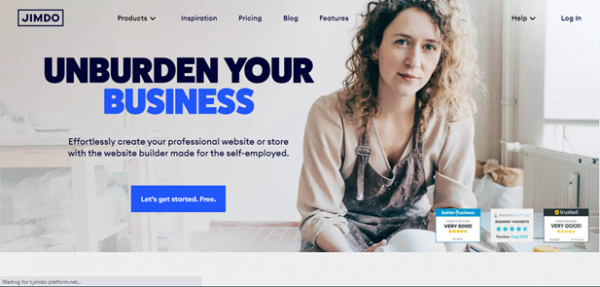
You don’t have to spend a fortune to create a website using Jimdo’s simple-to-use tools and ad-free environment. Wix and Squarespace competitors Jimdo and Weebly are also free to use, and Jimdo is an excellent choice if you’re trying to stay inside a tighter budget.
Key Features
- Creative Gallery – Jimdo has very simple tools for creating your website’s design. Once you select from a gallery of templates, you can use the drag and drop editor to change the colors, photos, or fonts on the site.
- Simple Web Page Creator – Jimdo makes it easy for anyone to create web pages. There are so many templates available that your options are nearly unlimited. Plus, it works with all modern browsers and mobile devices.
- SEO Toolkit – Jimdo has a built-in SEO toolkit that helps you optimize your site for the search engines. This allows your site to show up higher on the search engine results pages.
- Excellent Customer Support – Jimdo’s customer support is excellent. They email you a link to your site once it is complete and it has been approved by the site owner. Plus, the staff can answer any questions about the site until you are satisfied with it.
Pricing per Month
- Start – $ 9
- Grow – $ 15
Pros
- Simple to use
- It packs a robust set of features
- Excellent website hosting solution
Cons
- It doesn’t offer as many templates as other websites on our list
Best Ecommerce Website Builder for Small Business
Finding the perfect ecommerce website builder for a small business is not easy. You have to find one that can offer all the options you need for your site and won’t cost you a fortune. Here are our top picks:
1. Ecwid
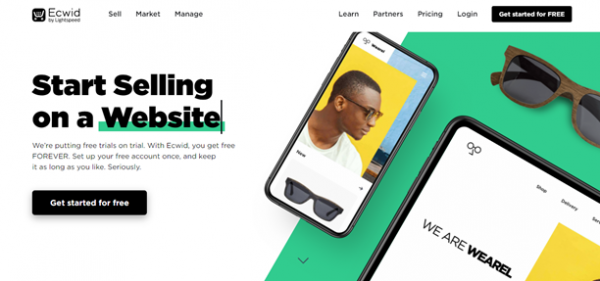
For more than a decade, Ecwid has been the go-to choice for small ecommerce companies. Not only that, but their new website builder is the perfect combination of features, usability, and simplicity for creating an online store. It also includes a powerful built-in shopping cart that allows you to easily sell products without any hassle.
Key Features
- Easy to Use – The Ecwid website builder is very easy to use. You can take a look at their library of templates before deciding on your own design. The templates are simple and help you create an online storefront that’s straight to the point.
- Completely Free – Ecwid comes with a free plan that’s perfect for any small business just starting out. This is the best option for small businesses and online retailers who don’t have much money to spend and still want to look good.
- Customer Support – Ecwid’s customer support team works hard to keep you satisfied with their products. They allow you to reach them through several channels (email, chat, phone), and they are very responsive to any questions you might have.
Pricing per Month
- Free
- Venture – $ 12.50
- Business – $ 29.17
- Unlimited – $ 82.50
Pros
- Ideal for creating an instant website with a functional checkout
- Easy to use and quick to accomplish
Cons
- Its feature set is very limited
- You can’t customize your website too much
2. Shopify

Creating an online store with Shopify is a simple process. It allows you to sell both physical and digital products and gives you a variety of ‘themes’ to choose from. Each of these themes can be customized to meet your specific branding needs. When it comes to building an online store, you don’t need to know any coding at all if you use Shopify. However, the platform also provides full access to CSS, HTML, and Liquid (Shopify’s templating language).
Key Features
- Theme Library – Each of Shopify’s 15 free ecommerce templates (or ‘themes’) comes with two or three different variations, allowing you to choose from a reasonable number of options. Although limited, they’re highly customizable via code or drag and drop.
- Ease of Use – Using Shopify is a breeze thanks to its easy-to-navigate interface and the positive user experience it offers. Like other content management systems, Shopify uses a left-hand menu to access features and content, which can be customized or edited on the right.
- Content Formatting – Most free Shopify themes still use a WYSIWYG (What You See Is What You Get) editor, which works fine but doesn’t give you as much control over how your content is laid out on a page as other website builders do.
Pricing per Month
- Basic – $ 29
- Shopify – $ 79
- Advanced Shopify – $ 299
Pros
- Dedicated support team
- Very simple, user-friendly UI
- The themes are very customizable
Cons
- Limited free theme selection with paid plans
3. Zyro
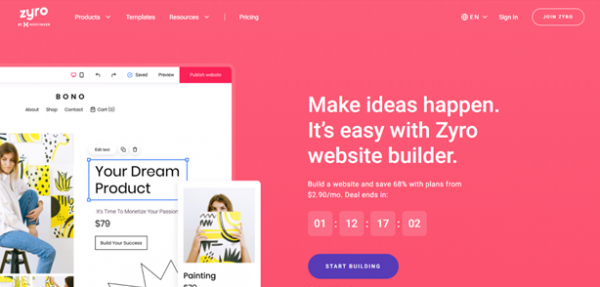
Using Zyro’s DIY website builder, you can have complete control over your online presence thanks to its intuitive user interface and unique, powerful tools. A lack of a free option and a few design restrictions may limit your choices, but the service is ideal for small businesses who want to open an online presence.
Key Features
- Mobile-responsive Sites – When viewed on a smartphone or tablet, Zyro’s automatically generated responsive mobile sites look fantastic. Even when you’re editing a desktop site, you can switch to the mobile editing view by clicking the mobile icon.
- Blogging – Create posts with Zyro’s easy-to-use blogging tool. Bluehost and Wix’s content management systems are more robust and user-friendly, but this one has gotten better with more categories and social sharing options. Many WordPress users may find it strange to have separate text and image sections in a post rather than simply typing words and sprinkling images in.
- eCommerce – The e-commerce tools provided by Zyro provide numerous ways to make money. A store that supports one or more of these languages, as well as automatic shipping estimates, real-time tracking, discounting options, and the ability to create favorites or wish lists, can be created with these options. WYSIWYG editors in the storefront allow you to add multimedia and HTML product descriptions.
Pricing per Month
- Website – $ 2.90
- Business – $ 4.90
- Online Store – $ 8.90
- Advanced Store – $ 15.90
Pros
- Simple and straightforward to use
- Excellent blogging tools
- Affordable and easy to understand pricing structure
Cons
- The UI could be more user friendly
Easy Website Builder for Small Business
Some website builders are more advanced. However, that might also mean they’re much more complex to use. And if you don’t have the time or resources to waste learning the ropes, then they’re definitely not the right choice for you. Below, we’ve rounded up some of the easiest to use website builders for small businesses we think you might like:
1. Site123
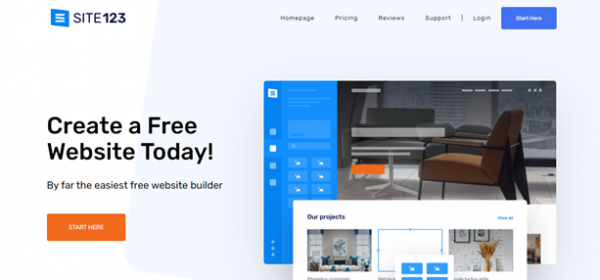
Before developing a custom template with all the features you require, Site123 will ask you a few questions, such as the type of website you desire and the site’s name. Isn’t it cool?
That Site123 is designed for people and businesses who want a website up and running quickly is no surprise. Even though it’s not the ideal choice for highly sophisticated or powerful websites, it’s hard to beat for speed and efficiency (as well as tons of helpful support along the way!).
Key Features
- Impressive Analytics – A site’s analytics are an essential part of its operation. It doesn’t matter if you want to know how long a person spends on one of your pages or how many views your most recent blog post has received. Site123 makes use of Google Analytics instead of its own in-house tracking system. Because Google Analytics has been around for a long time, you can rely on it to give you accurate and immediate results.
- SEO – Site123 provides search engine optimization (SEO) solutions to help ensure that your website ranks as high as possible on search engines like Google. Things like the ability to alter the meta title and description (the language that displays on Google’s search page), the ability to customize URLs, and the ability to add alt text to images all contribute to better SEO. That may sound a little hard, but don’t worry, Site123 has detailed tutorials to walk you through the process.
Pricing per Month
- Free
- Premium – $ 5.80
Pros
- Excellent customer support
- The templates are mobile-responsive
- Builds a website for you in less than 10 minutes
Cons
- It’s very simple and lacks any real functionality
- The storefronts are not very customizable
2. Web.com
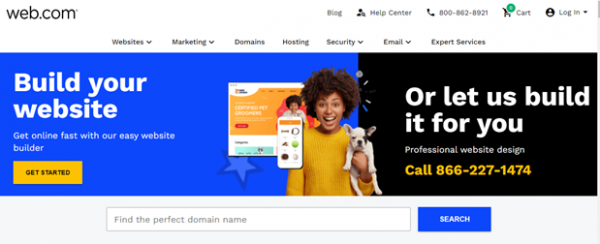
Web.com’s target audience is small enterprises, and we think that this builder is ideal for that demographic. An appealing and professional-looking website may be built in less than an hour using this platform. If you’re looking to expand your business online, this is a great option.
Key Features
- Theme Library – Web.com’s templates, while not groundbreaking, are all neat and tidy. So that you can quickly locate a template that applies to your specific situation, you can categorize them by industry. When it comes to customizing templates, certain businesses have less options than others, but at least one is available for everyone, and you can make it your own.
- User-friendly Editor – There are a lot of editors out there, and Web.com’s isn’t any different. Because it only allows you to drop and drag a restricted number of elements, you can arrange them any way you wish. As a result, customizing your template is a breeze.
- Extensive Knowledge Base – Using the search bar, you can go through a plethora of articles in Web.com’s knowledge base to find solutions to your problems. However, we had a difficult time finding what we were looking for. This is because Web.com also sells hosting and domains, so our search results weren’t always about website-building software.
Pricing per Month
- Starter – $ 10
- Online Marketing Package – $ 15
- eCommerce – $ 20
Pros
- The plans are quite expensive if you want ecommerce functionality
- Its intro offers are cheap
- You can publish a site almost instantly
Cons
- Doesn’t offer a free plan
- Its customization tools are quite limited
3. WordPress
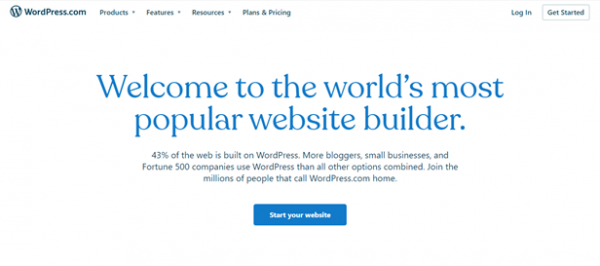
WordPress got its beginnings in 2003 as a simple blogging tool. A content management system and an application development framework have been developed since then. Using WordPress, you can create almost any kind of website you can imagine. See how WordPress’s user interface has evolved over time in our article on WordPress’s history of user interface changes.
Key Features
- Extremely Flexible – The primary reason WordPress is so popular for creating websites is because it is so flexible. WordPress may be used to create a wide variety of websites. Use it to start a blog, build an online store, run a membership site or marketplace, sell online courses, and more.
- Extensive Theme Library – A strong templating engine in WordPress controls website look. It’s possible to create a set of ‘Themes’ using this templating engine. There are literally tens of thousands of pre-built WordPress themes to choose from.
- Plugins and Widgets – As a result of its popularity, WordPress has become the platform of choice for developers to create their own plugins. Plugins are the name given to these types of add-ons. You can think of WordPress plugins as apps for your site. WordPress plugins, like mobile apps, allow you to extend the functionality of your website.
Pricing per Month
- Free
- Personal – $ 4
- Premium – $ 8
- Business – $ 25
- eCommerce – $ 45
Pros
- Completely free
- Tons of customization functionality
- There are tons of widgets,s extensions, and plugins to choose from
Cons
- There are no aspects of your site that are automated, and you have to do everything from security to CMS
- If you want to make a ton of changes, you’ll need to learn how to code
4. LeadPages
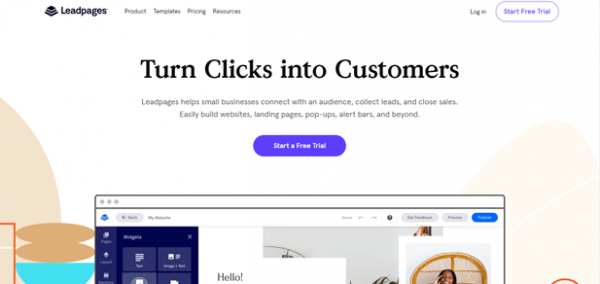
Using Leadpages, you may collect email addresses from visitors to your website. Leadpages is designed to help you do just that, and they offer a plethora of beautiful templates for lead magnets, webinars, and landing pages that you can use to build your email list.
Key Features
- Customizable Pages – As a result of the platform’s customizability, customers can create their landing pages to their liking. Simple drag-and-and-drop operations allow users to customize their pages regardless of whether they’re being used on a desktop or a mobile device. Users have the option to add photographs, texts, and widgets to their content in order to make it more appealing to their audience.
- Ready-Made Templates – With Leadpages, you get access to a wide variety of pre-designed themes. These templates have the benefit of being professionally created while still meeting user expectations. Users can pick from a variety of templates, depending on their company’s size.
- A/B Split Testing – The platform’s A/B testing can be used by users to see how their site is doing. Making a final copy of the design before checking for design flaws is a good idea.
Pricing per Month
- Standard – $ 49
- Pro – $ 99
- Advanced – $ 399
Pros
- Extremely advanced landing page builder
- Easily integrated into other software
- A ton of functionality for making the best website
Cons
- Has a significant learning curve
5. Strikingly
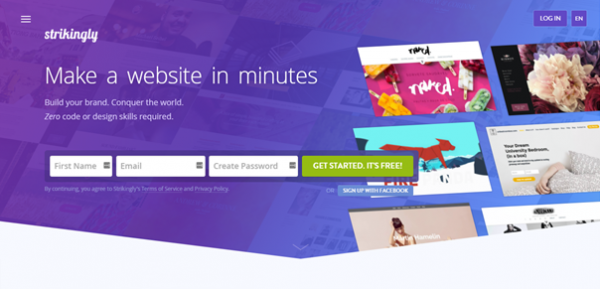
With Strikingly, anyone can develop a modern and appealing website even if they have no previous web design knowledge. Seth Godin, a well-known marketing expert and author endorses it. Using Strikingly, you can easily build a website for yourself, your small business, or even an e-commerce site. There is no need for any coding experience. You’ll get access to a drag-and-drop website builder that provides easy-to-use custom templates and stunning design tools.
Key Features
- Single-Page Scrolling Websites – Multi-page websites are supported by most similar systems. In contrast, Strikingly focuses on developing single-page websites with minimal content. In order to achieve this, the company offers layouts that heavily rely on vertical scrolling.
- Easy to Use – Strikingly is a simple drag-and-and-drop site builder. You won’t have to write a single line of code, thanks to the graphical editor. It’s as simple as dragging and dropping page items onto different sections and then changing their settings.
- Theme Selections – Ten major templates are available from Strikingly. There are a variety of subcategories available, including business, personal, and portfolio. Despite the fact that there are only a few, these templates offer a vast variety of options.
Pricing per Month
- Limited – $ 8
- Pro – $ 8
- VIP – $ 49
Pros
- Extensive online knowledge database
- The drag and drop builder is exceptional
- 14-day free trial
Cons
- Customer support can be hard to reach
Comparison Table
Here is a brief comparison of all website builders:
| Website Builder | Cheapest Business Plan | Free Version? | Free Domain? | Storage | Bandwidth |
| Wix | $ 4.50 |  |
? | From 500MB a month | From 1GB and Up |
| Squarespace | $ 19 | ? | ? | Unlimited | Unlimited |
| Weebly | $ 5 |  |
 |
From 500MB a month | Unlimited |
| Google Sites | Free |  |
 |
Unlimited | Unlimited |
| Webflow | $ 12 |  |
 |
Unlimited | Unlimited |
| Carrd | $ 9 |  |
? | N/A | N/A |
| Square Online | $ 12 |  |
? | Unlimited | Unlimited |
| Jimdo | $ 9 |  |
 |
Up to 5GB | From 500MB to Unlimited |
| Ecwid | $ 12.50 |  |
? | Unlimited | Unlimited |
| Shopify | $ 29 | ? |  |
Unlimited | Unlimited |
| Zyro | $ 2.90 | ? |  |
Unlimited | Unlimited |
| Site123 | $ 5.80 |  |
 |
From 500MB a month | From 1GB and Up |
| Web.com | $ 10 |  |
 |
Unlimited | Unlimited |
| WordPress | $ 4 |  |
 |
From 3GB and Up | Unlimited |
| LeadPages | $ 49 | ? |  |
Unlimited | Unlimited |
| Strikingly | $ 8 |  |
 |
From 1GB and Up | From 50GB and Up |
How To Build My Own Website on a Website Builder for Small Business: Tutorial
Below, we’re teaching you how to build your own website using Wix.
Step One: Create an Account
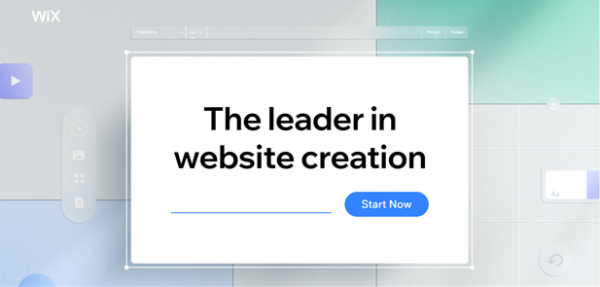
When you land on the Wix homepage, you’ll be greeted with a floating window like the one above. Input your email address, and click the Start now button. After that, you’ll be prompted to create an account. Here, you’ll need to input basic information such as your email address and preferred password.
Step Two: Get Started
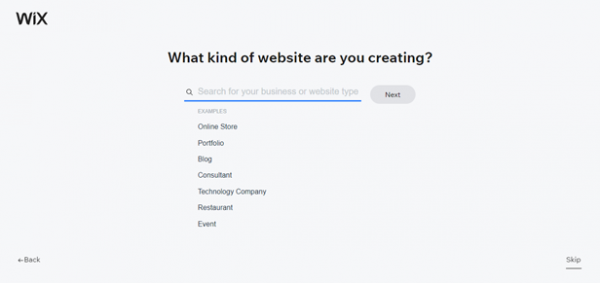
Once you’ve created an account, click the Get Started Button. From here, you’ll input important information about your websites, such as the kind of business you’re in, the name of your store, and the kind of features you want to add to your websites, such as an online store, forms, or a chat button.
Step Three: Choose A Theme
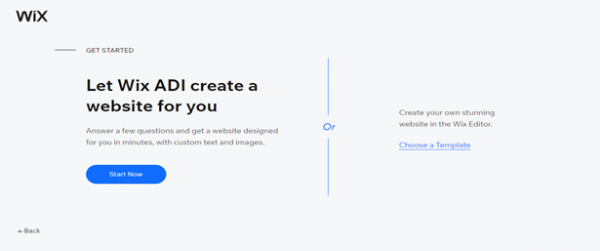
Next, you’ll need to decide whether you want Wix to build your website for you in under 5 minutes or if you want to customize a theme to fit your needs. Take your time deciding here because if you decide to switch themes, you’ll lose all progress.
Step Four: Customize Your Site
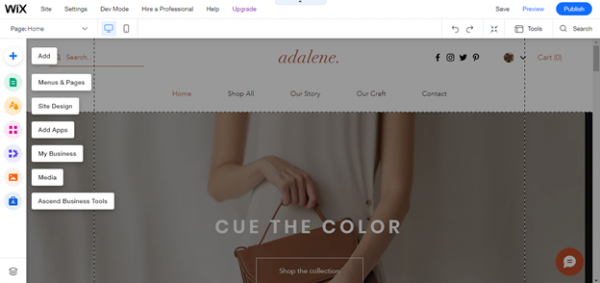
Add content, find out what the finished product will look like, and customize it to your liking. The website builder has a wide range of design templates to choose from, but you can also upload your own images and text before your browser begins building your site.
Step Five: Publish!
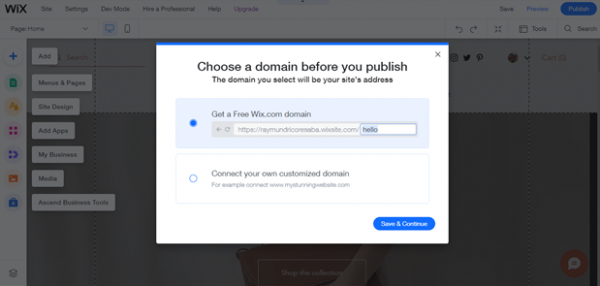
Lastly, click the publish button to publish your site! When you do this, you’ll need to select what type of domain you want as well, so it will determine whether you’ll proceed with a free plan or a paid plan.
Conclusion: What Is the Best Website Builder for Small Business for 2022?
While there is no such thing as the best website builder for small businesses, we’ve compiled some of the best choices in this article for you. Keep in mind that what works for us may not work for you, so you want to consider the following before making a decision.
Wix has the most features, with 100 million websites under its belt since 2006. The service is free for now, which is great for free users and allows you to become familiar with the site before making your first purchase. It’s an easy website builder to use and helps you publish your website quite quickly.
FAQs
Which website builder is the easiest to use for small businesses?
Site123 is an excellent option for small businesses because it’s very user-friendly. If you’re new to website building, the interface will make it easier for you to choose themes and customize the site.
Is Wix good for small businesses?
The website builder is great for small businesses, but it’s not the best for larger companies or businesses with a lot of content. Some people believe that Wix is tricky to use, so you may need to learn how to use the site without any problem.
Which is better for small businesses: Weebly or Wix?
Both Weebly and Wix are excellent choices for small businesses, but keep in mind that one is free and the other is not. If you’re on a budget, we recommend Weebly because it’s free, and you can try it before committing to a lengthy and costly contract.
Does Wix take a percentage of sales?
No, there are no hidden fees of any kind with the website builder. It’s a great option if you’re looking to sell anything online and don’t want to pay any extra fees.
Do I need hosting for my small business?
You can use almost any hosting provider you like, but Wix offers a wide range of hosting fairly affordable packages. You can choose the hosting package that works best for your business and scale it if you want more features or space.
Is it better to use WordPress for small businesses?
Just like Wix, WordPress is also suitable for small businesses. The website builder has a large number of themes for small businesses that you can select according to your needs, as well as dozens of options for how to manage your content and customer service.
Is it good to use a fully-hosted website builder for my small business?
Yes, the fully-hosted option is an excellent choice since it’s part of the service. You don’t have to purchase hosting separately and can get started with your site immediately.
Can I use a site builder if my business is security-sensitive?
Yes, Weebly and Wix are equally secure since they are both hosted by Google. The advantage of a site builder is that you can focus on your business rather than technical issues, so it’s a great choice for businesses that require higher levels of security.
(52)
Report Post

